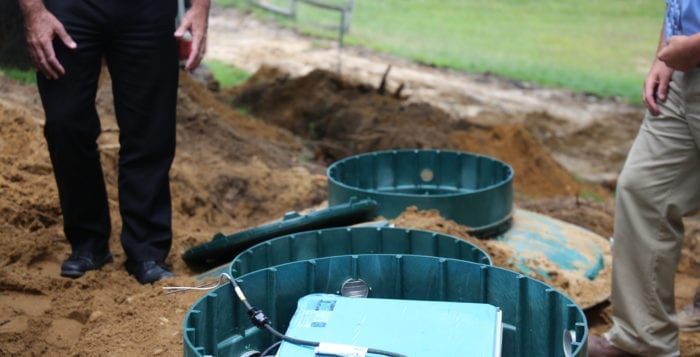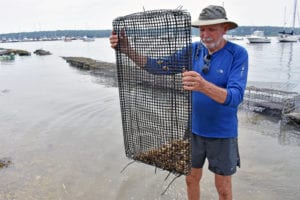Homeowners taxed on prototype nitrogen filters

People enrolled in county septic program say it’s political
Suffolk homeowners, who received county grants to install nitrogen-reducing septic systems as part of the county’s septic program, are facing the reality of additional tax burdens and payments after they received IRS 1099 tax forms in the mail.
Participants in the Suffolk County Septic Improvement Program, which helped install prototype home septic systems that filter out nitrogen in participants homes, were told since the program’s inception in 2017 that only the contractors who did the installation of the systems would need to declare the grant money as taxable income because they received disbursement of funds from the county.
This year, the office of Suffolk County Comptroller John Kennedy Jr. (R) sent tax forms to the program participants, and in many cases both homeowners and contractors received 1099s for the same job, despite a legal opinion by the county’s tax counsel that advised that the tax forms go to the companies that received the funds, not homeowners.

In response, Deputy County Executive Peter Scully sent a letter to the comptroller’s office on March 14 requesting that Kennedy rescinds the 1099 forms issued to homeowners. After getting no response, Scully sent a second letter on March 26 asking Kennedy again to rescind the 1099s and mentioned since the first letter there had been new information that had come to light in the issue.
Scully stated that the county’s Department of Health Services has confirmed that some of the homeowners who received 1099s have declared the grants as income and like the contractors will be paying taxes on the same grants.
“It boggles the mind that anyone can believe that having both homeowners and installers declaring the same grants as income and having taxes paid by both parties on the same disbursement of funding is an acceptable outcome,” the deputy county executive said in a statement.
In a Newsday article earlier this month, Kennedy said he planned to ask the Internal Revenue Service for a private letter ruling on the matter. Scully said that would be unnecessary, citing again the county’s legal counsel advice and other municipalities who have similar programs and are structured the same way. The letter ruling would cost close to $30,000 and could take more than a year, Scully added.
Some residents who are enrolled in the program have claimed Kennedy, who recently announced he is running against County Executive Steve Bellone (D) in the next election, is politicizing the issue and potentially sabotaging the program.
“I have no doubt in my mind,” Tim Sheehan of Shelter Island. “I don’t understand the rationale behind double taxing participants besides politicizing water safety and punishing homeowners for doing the right thing.”
The Shelter Island resident was one of the early applicants of the program and had an advanced septic system installed in his home August 2018. He said without the help of county and town grants he and his wife would’ve not been able to afford the upgrade.
The deadline to file taxes is April 15.
While Sheehan expected to pay taxes on the town grant, he didn’t anticipate the county liability. He said he is facing close to a $3,000 higher tax bill on the $10,000 grant and as a result has put him into a higher tax bracket and is required to pay a higher percentage on his income.
“Nowhere in the grant contract is there a mention of a tax liability to homeowners,” the Shelter Island resident said. “From the get-go we were told there would be no tax burden.”

The Shelter Island resident was surprised when he received a 1099 form for the system and reached out to county officials for help. When they said they couldn’t help, Sheehan called the comptroller’s office hoping to speak to Kennedy directly. After numerous calls without getting a response, Kennedy finally called him.
When questioned Kennedy blamed the current administration for mishandling the issue and told Sheehan that he never agreed with the county’s legal counsel decision.
Kennedy has not responded to requests for comment.
George Hoffman, co-founder of the Setauket Harbor Task Force, said the tax form issue couldn’t have come at a worse time for a program that not only helps homeowners but improves water quality and waterways on Long Island.
Hoffman said excess nitrogen, from homes with outdated septic systems or cesspools, seeps through the ground causing harmful algae blooms and can negatively affect harbors and marshes that make areas more susceptible to storm surges as well.
“These people are pioneers, we should be applauding them for doing the right thing,” the task force co-founder said.
Hoffman added he supports any effort to reduce excess nitrogen in our waterways and said many homes on Long Island have septic system that are in need of replacement. He is also concerned that the comptroller’s decision could stunt the progress the program has already made.
Bellone has said there are about 360,000 outdated and environmentally harmful septic tanks and leaching systems installed in a majority of homes across the county, and with the issue of being taxed, dozens of applicants have dropped out of the program after learning of Kennedy’s decision to issue forms 1099 to homeowners, according to Scully.
Officials in the county executive’s office are concerned it could endanger the future of the program and impact funding from the state. In early 2018, Gov. Andrew Cuomo (D) awarded Suffolk County $10 million from the Statewide Septic Program to expand the county’s denitrifying systems.
State officials in Albany are aware of the ongoing situation and are similarly concerned, according to Scully. If the IRS were to side with Kennedy, he said they would turn to representatives in Congress for assistance, arguing that those funds shouldn’t be going to Washington but back into taxpayers pockets.






